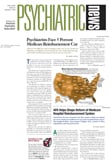The Centers for Medicare and Medicaid Services (CMS) issued a revision to administrative rules governing the Emergency Medical Treatment and Labor Act (EMTALA) that grants hospitals greater discretion in developing emergency department on-call lists for specialists. The rule went into effect on November 10.
Some physicians say, however, that the rule may exacerbate an existing shortage of on-call specialists in emergency departments.
EMTALA requires a hospital to provide an appropriate medical-screening examination to any person who comes to the hospital emergency department and requests treatment or an examination for a medical condition. If the examination reveals an emergency medical condition, the hospital must stabilize the patient or transfer him or her to another medical facility.
EMTALA applies to all hospitals that participate in the Medicare program and offer emergency services, and it covers all patients treated at those hospitals, not just those who receive Medicare.
Under the new rule, hospitals will have greater discretion to develop their lists of on-call specialists, in accordance with the time constraints and obligations of those specialists. Also, physicians will be permitted to be on call simultaneously at more than one hospital and to schedule elective surgery or other medical procedures during on-call times.
In the past, hospitals seeking to conform to stringent EMTALA requirements had to force some specialists to be on call 24 hours a day, 365 days a year, with the result that specialists limited themselves to just one hospital to avoid a grueling or impossible on-call schedule.
“We believe this regulation will help to ensure that emergency departments and specialty physicians are there for those who need them,” said CMS Administrator Thomas Scully. “It is consistent with the recommendations of the Secretary’s Advisory Committee on Regulatory Reform to help hospitals focus less on unnecessary requirements and more on providing quality care to their patients.”
But George Molzen, M.D., president of the American College of Emergency Physicians, said the rule could potentially increase the shortage of on-call medical specialists available to provide backup support to emergency departments and multiply the number of patients transferred to hospitals able to provide this coverage.
“Under the new rule, hospitals may not have to provide on-call medical specialists, such as neurosurgeons, orthopedists, and plastic surgeons, around the clock for emergency patients,” he said. “Hospitals also can allow specialists to opt out of being on call to the emergency department. This means that patients in need of specialty care may need to be transferred to other hospitals. But the question is where? We already have a shortage of on-call specialists because of the medical liability crisis. This rule could exacerbate an already difficult situation.
“Without a hospital or on-call physician obligation to provide emergency specialist backup, some hospitals may choose not to provide emergency coverage at all,” Molzen said. “Therefore, the new rule could potentially leave only a few hospitals with medical specialists, which means those hospitals may be flooded with emergency patients. It could result in conflicts between hospitals over who will provide specialty care and result in delayed care or more transfers of patients, exacerbating the ambulance-diversion problem in the United States.”
Michael Allen, M.D., past president of the American Association of Emergency Psychiatrists (ACEP), said many specialists profit from emergency coverage because the patients they treat are often then referred to their specialty service.
That has not typically been the case for psychiatrists, especially in the last 20 years, because of the way managed care controls referrals, said Allen. Allen is an assistant professor of psychiatry at the University of Colorado School of Medicine and was chair of the now-retired APA Task Force on Emergency Psychiatry.
For that reason, psychiatrists do not typically do on-call emergency department work. Hospitals often employ nonpsychiatrist professionals, including social workers, who work under the supervision of an emergency department physician. Further, many hospitals are closing their psychiatry services altogether, he said.
With regard to other specialties, Allen said he was skeptical of ACEP’s concerns and added that the rule change was just as likely to help increase the pool of on-call specialists—precisely as the government hopes.
In the past, he said, stringent EMTALA requirements around specialist coverage and response time gave emergency departments considerable power over a specialist’s time, diminishing the specialist’s incentive to be on call at multiple hospitals in a community.
“What the government is saying is that you can be on call in multiple places at one time,” he said. “That may actually increase the pool of people who will be on call at any one time in a community, because specialists will be more willing to be on call at more than one hospital.”
The new rule also expands the definition of emergency department to include any department or facility of the hospital, whether situated on or off the main hospital campus, that is licensed by the state as an emergency room or emergency department; is held out to the public as providing care for emergency medical conditions without requiring an appointment; or has provided, during its previous calendar year, at least one-third of all its outpatient visits for the treatment of emergency medical conditions on an urgent basis.
More information on the EMTALA rule is posted on the Web at www.cms.hhs.gov/media/press/release.asp?Counter=837. ▪
